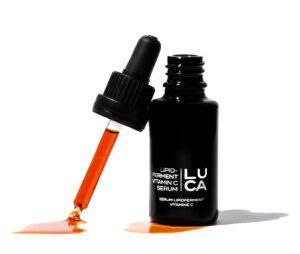As we age, our skin undergoes various changes, and one of the notable transformations is the phenomenon known as “inflammaging.” The term combines two words: “inflammation” and “aging,” and refers to the chronic low-grade inflammation that occurs in the skin as we grow older. Inflammageing is a complex process influenced by both intrinsic and extrinsic factors, and understanding its impact on the skin can help us develop effective strategies to promote healthy aging. In this blog post, we delve into the concept of inflammaging of the skin, its causes, and potential ways to mitigate its effects.

What is skin inflammaging?
The science behind the ‘Term Skin Inflammaging’ – Inflammation is a natural response of the body to protect against harmful stimuli, such as infections or injuries. However, as we age, this response becomes dysregulated, leading to a chronic, low-grade inflammatory state. Inflammageing is thought to arise from a combination of factors, including genetic predisposition, cellular senescence (the process of aging at the cellular level), oxidative stress, hormonal changes, and environmental factors such as ultraviolet (UV) radiation and pollution.
Effects of Inflammaging on the Skin
Inflammaging affects various components of the skin, leading to visible changes in its appearance and function. Some of the common effects include:
- Wrinkles and Fine Lines: Chronic inflammation triggers the breakdown of collagen and elastin, the proteins responsible for maintaining the skin’s elasticity and firmness. As a result, the skin becomes more prone to wrinkles, fine lines, and sagging.
- Dryness and Thinning: Inflammation can disrupt the skin’s moisture barrier, impairing its ability to retain water. This can result in dryness, roughness, and a loss of plumpness. Additionally, inflammaging affects the epidermis, the outermost layer of the skin, causing it to become thinner and more fragile.
- Age Spots and Uneven Pigmentation: Inflammation can stimulate the production of excessive melanin, leading to the formation of age spots (hyperpigmentation) and uneven skin tone.
- Delayed Wound Healing: Inflammaging compromises the skin’s ability to heal wounds and recover from injuries. The prolonged inflammatory state slows down the regeneration process, leaving the skin more susceptible to infections and scarring.
- Increased Sensitivity: Inflammation can make the skin more sensitive and reactive, resulting in conditions such as rosacea and eczema.
Limiting the Effects of Inflammaging
The existence of chronic inflammation in the epidermis, the outermost layer of your skin, will damage the skin barrier and induce redness, dryness, or irritation, Inflammaging mirrors itself on the surface of the skin with visible signs of redness, enlarged pores, volume loss, thinner skin, darker undereye circles, acne, and other skin conditions. While we cannot stop the natural aging process, there are several ways to manage and reduce the impact of inflammation on the skin:
- Sun Protection: Protecting your skin from UV radiation is crucial. Wear sunscreen daily, seek shade during peak sun hours, and use protective clothing and accessories.
- Balanced Diet: Consume a nutrient-rich diet that includes antioxidants, vitamins, minerals, and omega-3 fatty acids. These help combat oxidative stress and support skin health.
- Skincare Routine: Follow a consistent skincare regimen that includes gentle cleansing, moisturizing, and the use of products containing Antioxidants, Retinol Alternatives, or peptides, which can help promote collagen production and reduce inflammation.
- Stress Management: Chronic stress can exacerbate inflammaging. Incorporate stress reduction techniques such as meditation, holistic breathing techniques, exercise, and hobbies into your lifestyle.
- Lifestyle Factors: Avoid smoking and excessive alcohol consumption, as these can contribute to skin inflammation and premature aging.
Fermentation A True Skin Saviour
Fermentation is a process that involves breaking down the molecules in an ingredient using microorganisms like bacteria or yeast. This process can enhance the bioavailability and effectiveness of the oils by increasing the concentration of beneficial compounds and generating new components.
Postbiotic cosmetic ingredients have shown the potential in calming skin inflammation. Postbiotics are metabolic byproducts produced by probiotic bacteria during the fermentation process. They include substances like peptides, enzymes, organic acids, vitamins, and antioxidants. While probiotics are live bacteria and prebiotics are substances that support the growth of beneficial bacteria, postbiotics are the compounds produced by these bacteria.
Postbiotics have gained attention in skincare for their ability to promote a healthy skin barrier, support the skin’s microbiome, and exhibit anti-inflammatory properties. Here’s how postbiotic cosmetic ingredients can help calm skin inflammation:
- Strengthening the Skin Barrier: Postbiotics can help strengthen the skin barrier function, which is crucial in reducing inflammation. A healthy skin barrier acts as a protective shield, preventing irritants, allergens, and pathogens from penetrating the skin. By enhancing the skin barrier, postbiotics help reduce inflammation caused by external factors.
- Balancing the Microbiome: Postbiotics help create an environment that supports the growth of beneficial bacteria while inhibiting the growth of harmful bacteria. By balancing the skin’s microbiome, postbiotics can help reduce inflammation associated with an imbalanced microbial ecosystem.
- Anti-Inflammatory Effects: Postbiotic ingredients, such as peptides and organic acids, have demonstrated anti-inflammatory properties. They can help soothe and calm irritated skin, reducing redness and inflammation.
- Wound Healing: Some postbiotic ingredients have been found to accelerate wound healing. By promoting the regeneration of skin cells, postbiotics can minimize inflammation associated with the healing process.
- Antioxidant Activity: Many postbiotic compounds possess antioxidant properties. They can neutralize free radicals and protect the skin from oxidative stress, which can contribute to inflammation. By reducing oxidative damage, postbiotics help maintain a healthier skin environment.
Our Solution
LUCA Lipid Ferment Vitamin C Serum is a Potent Defender Against Skin Inflammaging, carefully and thoughtfully formulated to specifically protect against and help prevent Skin Inflammaging ⎯ Let’s break down the specific ingredients:
The foundation of the formulation is fermented and incredibly rich in postbiotics along with additional fermented ingredients including – White Willow Bark, Gromwell Root, Angelica Root, Licorice Root, Sunflower Seed, Olive Fruit and Argan Kernel.
Ascorbyl Tetraisopalmitate (Vitamin C) has anti-inflammatory properties that can help calm and soothe the skin. Inflammation is a common feature of skin aging and can exacerbate various skin conditions, such as acne, rosacea, and eczema. By reducing inflammation, Ascorbyl Tetraisopalmitate helps mitigate skin inflammaging and promotes a more balanced and healthy complexion.
Schisandra Sphenanthera Fruit Extract is derived from the Schisandra plant, which has been used for centuries in traditional Chinese medicine. This Bioactive Concentrate is rich in antioxidants and exhibits anti-inflammatory properties. It helps to protect the skin against oxidative stress additionally, Schisandra has been shown to enhance the skin’s natural defence mechanisms, improving its ability to resist external stressors and reduce inflammation.
Commiphora Mukul Resin Extract, also known as Guggul, is obtained from the Commiphora Mukul tree. This Bioactive Concentrate has been used in Ayurvedic medicine for its anti-inflammatory and rejuvenating properties. It contains potent bioactive compounds that help suppress inflammation and protect the skin from damage caused by free radicals. Additionally, Commiphora Mukul Resin Extract has been found to stimulate collagen synthesis and improve skin elasticity, making it a valuable ingredient in combating the signs of inflammaging.
Haematococcus Pluvialis Extract is derived from a microalga known as Astaxanthin. Rich in antioxidants, a powerful antioxidant known for its ability to neutralize free radicals and protect the skin from oxidative stress. Demonstrates anti-inflammatory properties, which can help calm and soothe irritated or inflamed skin. It can help reduce redness, itching, and other signs of inflammation, making it beneficial for individuals with sensitive or reactive skin.
Phaeodactylum Tricornutum – Is derived from a type of microalgae known as diatom, the extract has demonstrated anti-inflammatory properties that can help calm and soothe irritated or inflamed skin. It helps reduce redness, itching, and other signs of inflammation, making it beneficial for individuals with sensitive or reactive skin. contains a rich profile of antioxidants, including vitamins, minerals, and polyphenols. These antioxidants help protect the skin from free radicals, which are known to contribute to premature aging.
Caulerpa Lentillifera Oil – Known as ‘Sea Grapes’ offers protection against Environmental Damage thanks to strong antioxidant activity that helps protect the skin from environmental aggressors, such as pollution and UV radiation. These antioxidants help neutralize free radicals and minimize the damage caused by external stressors, promoting a healthier and more resilient skin barrier.
Chlamydomonas Reinhardtii Extract – Derived from single-celled green microalgae, containing a variety of bioactive compounds, including amino acids, vitamins, minerals, and antioxidants, which contribute to its ability to protect against skin inflammaging.
Vitamin E – Is a potent antioxidant that neutralizes harmful free radicals in the skin, and exhibits anti-inflammatory properties that inhibit the production of pro-inflammatory molecules called cytokines and enzymes like cyclooxygenase (COX) and lipoxygenase (LOX), which contribute to skin inflammation. Vitamin E also functions as a photo protectant by absorbing UVB rays and limiting UV-induced damage. It helps protect against sunburn and reduces the risk of inflammation caused by UV exposure.
Maintaining proper hydration and a healthy skin barrier is crucial for fending off inflammaging. LUCA Lipid Ferment Vitamin C Serum has a proprietary Algae Complex this is an advanced blend of six water-sourced botanicals: Green Algae, Red Algae, Sea Grapes, Micro Glass Algae, Marine Bamboo and Irish Moss; collectively aiding in cellular renewal, offering both hydration and moisturization – defending against prevent transepidermal water loss (TEWL). By strengthening the skin barrier, LUCA reduces the risk of inflammation and maintains skin health.
Until next time, be human, be kind, be you.


REFERENCES:
- Pilkington SM, Bulfone-Paus S, Griffiths CEM, Watson REB. Inflammaging and the Skin. J Invest Dermatol. 2021 Apr;141(4S):1087-1095. doi: 10.1016/j.jid.2020.11.006. Epub 2021 Jan 7. PMID: 33358020. https://pubmed.ncbi.nlm.nih.gov/33358020/
- Barrier Function in Aging: Comments on Pilkington et al. “Inflammaging and the Skin” Journal of Investigative Dermatology, Volume 142, Issue 2, February 2022, Pages 483-484 – Peter M. Elias
Comments +